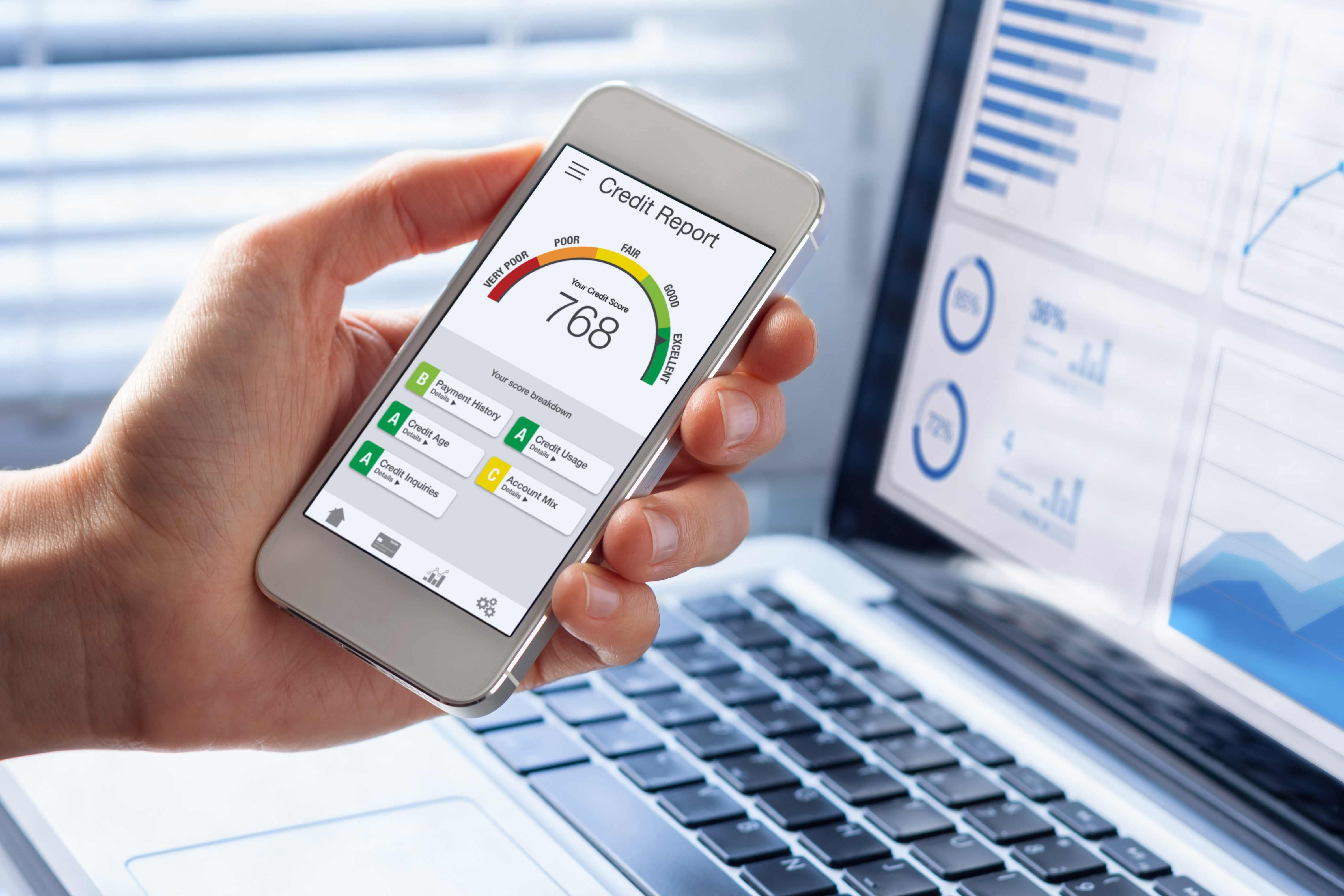
Disclaimer: Blog written by Sarah Sharkey for Cleaver Girl Finance (see below for full copyright information). The views and opinions expressed in this blog are solely those of the original authors and other contributors. These views and opinions do not necessarily represent those of FinancialEdge Credit Union.
Your credit score is an important number that can have a big impact on your life. Although it is just three digits, it can tell potential lenders a lot about your creditworthiness. If you regularly monitor your finances, you may notice when your credit score lowers. If it happens unexpectedly, you might ask, “Why did my credit score drop?”
In this article, I’ll walk you through some of the reasons behind a drop in credit score. Plus, I’ll also highlight ways to get your credit score back on the right track.
Why did my credit score drop? Here are 11 Common Factors.
A credit score is a reflection of your credit report. The factors that affect your credit score can pull it down or build it up depending on your choices and things like length of credit history, payment history, and more.
So wondering, “Why did my credit score drop?” Let’s look at eleven common reasons for a decrease in your credit score.
1. Too many hard credit inquiries
When applying for new loans, you are likely keeping a close eye on your credit score. You may notice a sharp drop while you are in the midst of applying for new loans.
In this case, the drop in your credit score is likely a result of too many hard credit inquiries. When you apply for credit, lenders and credit card issuers will pull your complete credit report to determine your creditworthiness.
Although credit inquiries play a small role in your overall credit score, it could be the reason behind your most recent drop.
If you’ve applied to several new lines of credit in the past month, this is the most likely reason for the drop. If you’re concerned that checking your credit score lowers it, know it is not considered a hard inquiry. You’ll only need to worry about hard inquiries if you apply for a new loan or line of credit.
2. Late and missed payments
A late payment can blemish your credit report, decreasing your credit score. That is especially true if you make late payments consistently. If you missed a payment altogether, that could cause your credit score to drop too.
Lenders favor borrowers who can make on-time payments regularly. A lower credit score could indicate to potential lenders that you aren’t consistent about making on-time payments.
3. Growing balances
The balance of revolving credit lines—like credit cards—can fluctuate each month.
For example, if you have credit card debt, it can grow each month that you don’t pay off your credit card account balance in full.
A growing amount of revolving debt leads to an increase in your credit card utilization ratio. If you have a $10,000 credit limit with a balance of $5,000, then you have a utilization rate of 50%.
In the FICO scoring model, around 30% of your FICO score comes from amounts owed. Knowing this, I recommend keeping your credit card and other revolving balances as low as possible. Many experts recommend keeping your credit utilization rate under 30% to prevent a negative impact on your score.
4. Why did my credit score drop after closing an old account?
Although it can be tempting to close an account because you may think it’s the best way to get out of debt, that can lead to a drop in your credit score.
FICO credit scores factor in the length of your credit history when calculating your score. Older accounts are considered a positive feature of your credit history.
After all, if you’ve been able to manage your credit for a long period of time responsibly, then lenders want to work with you. As you close older accounts, the average age of your credit accounts will fall and possibly drag your credit score down as well.
5. Bankruptcies on your credit report
Foreclosures and bankruptcies can significantly impact your credit score. A big dip in your credit score could result from a recent foreclosure or bankruptcy.
In most cases, this kind of mark on your credit report will have a large negative effect on your score. Unfortunately, the effects could impact your credit score for years.
6. Identity theft
Why did my credit score go down when nothing changed?
This question gets asked a lot. After all, why would your score drop if nothing has changed in your financial situation? One reason is identity theft.
Being a victim of identity theft is one of the worst reasons there is a drop in your credit score. If this happens, people can use your identity to apply for loans such as credit cards, open utility accounts in your name, and even steal your tax refund!
That’s why I suggest monitoring your credit regularly so you can ensure everything on it is legitimate. If someone is racking up debt and not paying bills in your name, it can be detrimental to your finances.
7. An error on your credit report
Another answer to the question, “Why did my credit score go down when nothing changed?” is simply a mistake on your credit report.
It’s sometimes possible that creditors made an inaccurate report to the credit bureaus (Equifax, TransUnion, and Experian). The error, in turn, impacts your score.
As soon as you identify an error, contact the reporting company to dispute the error on your credit report. You might also want to contact the credit bureaus to inform them of the error.
8. Credit limit was reduced
Another reason you could have a drop in your score is if a credit limit was reduced due to lack of use or due to changes in your credit. It could reduce your overall debt-to-credit ratio, which could impact your score.
You can contact the company to ask why they decreased your limit and possibly have it restored if possible. Also, paying down the balance will improve your score, so work on a debt reduction strategy and pay off your card monthly.
9. Paid off a loan
“I paid off a loan, so why did my credit score drop?”
While paying off a loan is a good thing—after all, you’re getting out of debt!—it can negatively affect your credit score. There are a few reasons for this:
You reduced your credit mix.
You closed the last account of a certain type of credit.
Paying off a loan reduces the amount of debt you owe and the type of credit accounts you have. Part of your credit score for most scoring models includes your credit mix and how many different types of credit you have.
Having a manageable mix of auto loans, student loans, mortgage payments, and credit cards can help show lenders you’re a responsible borrower—regardless of the type of credit being offered. When you pay off a loan, like a car loan, you’re removing a type of credit from your credit report.
10. Charge-offs on unpaid balances
If you simply stopped paying your debts, your creditors might write off the debt as uncollectable, known as a charge-off. It doesn’t mean you don’t have to pay your debt, but you may be paying a debt collection agency instead of your original lender.
Having a charge-off on your credit report can have negative effects. A charge-off can show up on your credit report for years to come. This makes improving your credit score or securing new credit accounts even harder.
Luckily, you may be able to remove a charge-off from your credit report.
11. Debt settlement
Debt settlement is negotiating with creditors to pay off your debt for a smaller amount than you owe. While this might sound like a good way to reduce debt, your credit score will feel the effects of settling debt.
When you settle a debt, you and your creditors are agreeing that you will never have the funds to pay all of the amount owed. The creditor takes a loss on the debt in the hopes of recouping some of the money they’re owed. This agreement is reported to the credit bureaus, who add it to your credit report.
Debt settlement is generally preferable to bankruptcy, but it can cause similar problems to your credit score. Settled debts tend to stay on your credit report for seven years, according to Experian. When a new lender sees that you settled a debt, they may be wary of lending money to you.
If you find your score went up or down slightly, it’s not usually a cause for concern. I recommend focusing on making payments on time, paying off debt, and watching your credit score for any big changes.
Why did my credit score go down when nothing changed and how can I tell?
The best place to start is by regularly monitoring your credit score. I have two favorite resources that will allow you to monitor your credit report for free:
Credit Karma
Credit Karma is a user-friendly site that will send you helpful alerts about your credit score. If there is a drop, then you’ll be able to act quickly.
With Credit Karma, you’ll have access to your credit score and credit reports from two of the three major credit bureaus.
The reports are updated weekly, so you’ll be able to check your credit report whenever you’d like to.
Annualcreditreport.com
The name gives away the services offered by this site; you’ll be able to see a credit report every 12 months. With this free credit report, you can check to ensure all your information is accurate every year.
Both options are trusted and useful ways to monitor your credit score. Take a minute to consider these options and decide which option will work best for you.
4 Ways to increase your credit score after a drop
If you’ve noticed a recent drop in your VantageScore or FICO credit score, rebuilding your credit might be a top priority. Luckily, it is completely possible to rebuild your credit.
As you improve your credit score, you’ll unlock better loan terms and rates for big purchases such as a house down payment or car. Better loan terms can result in thousands of dollars of savings over the lifetime of your loan.
If you implement the strategies below, you might be surprised how quickly your score can rebound. Let’s take a closer look at the best ways to start improving your credit score.
1. Pay down revolving debt balances
Revolving debt is associated with lines of credit that you can access with ease, such as your credit card or your home equity line of credit. Each month, you can potentially increase or lower the amount of this revolving debt.
These loans differ from installment loans, such as a personal loan with a scheduled repayment timeline and monthly payment. If you’ve allowed your credit card balances to grow, that will likely hurt your credit score, causing it to drop.
The solution is to pay down credit cards fast. Although becoming debt-free can be challenging, paying down your debt is completely possible.
Consider using the snowball method to kickstart your debt repayment journey. Along the way, you may need to consider starting a side hustle to increase your income or meal planning to stay on budget.
As you start to pay down your debt, celebrate the small wins. Every dollar you pay down is progress on your journey. It may not be an overnight path, but every step you take will bring you closer to being debt-free.
Plus, you’ll likely raise your credit score in the process.
2. Make on-time payments
Lenders value borrowers who can consistently make on-time payments to their debts.
In fact, making on-time payments is one of the fastest ways to improve your credit score. One way to consistently make on-time payments is to automate your finances.
Automation can be the key to learning how to manage your money efficiently. You’ll no longer need to worry about whether or not you remembered to pay your bills. Instead, all of your debt payments will be made on time without any headaches for you.
3. Credit builder loans
A credit builder loan is a surefire way to improve your credit score if you can make on-time payments. If you take out a credit builder loan, the loan amount will be held in a bank account until you repay the loan. Throughout the loan, you will make on-time payments that the lender reports to the credit bureaus.
The payments you make along the way will include both principal and interest. At the end of the loan term, you will receive the money the lender has been holding in your account. You’ll be able to build your credit score and learn how to save money at the same time.
4. Take our free course on how to build good credit
Since a good credit score can save you thousands of dollars, it is vital to take action. If you want to learn more about the ins and outs of building credit, then our free “Build Good Credit” course is a great resource.
You’ll learn more about the factors that affect your credit score.
Additionally, you’ll learn more about specific action steps that you can take to improve your credit score.
How long does a credit score drop last?
The amount of time a drop in your credit lasts depends a lot on what caused it to drop in the first place. Using a large amount of your credit card limit or having a few hard inquiries on your credit report, for example, often only drops your score temporarily.
Missing several payments or settling a debt, on the other hand, will likely cause a large drop in your score—and therefore take longer to build back up.
The best thing you can do if your credit score drops (after checking for fraud) is to continue making on-time payments and working to lower the amount of credit you use.
Why is my credit score so low when I have no debt?
There are lots of reasons why your score might be low even if you’re not carrying debt—and your lack of debt may be part of the cause. Creditors generally like to see a mix of different credit types when looking at your credit score.
For example, a person with a good credit mix might have a car loan, mortgage, and credit cards with on-time payments.
It’s possible to rebuild your credit!
A good credit score can unlock better loan terms for the big purchases in your life. With better loan terms, you can potentially save thousands of dollars over the lifetime of these major purchases, such as a home. Remember, at the end of the day, it’s all about using credit wisely.
Copyright: Written by Sarah Sharkey on March 9th, 2024 for Cleaver Girl Finance. Blog reviewed by Tara Seboldt and fact checked by Alex Loredo.
https://www.clevergirlfinance.com/why-did-my-credit-score-drop/
« Return to "Blogs"






